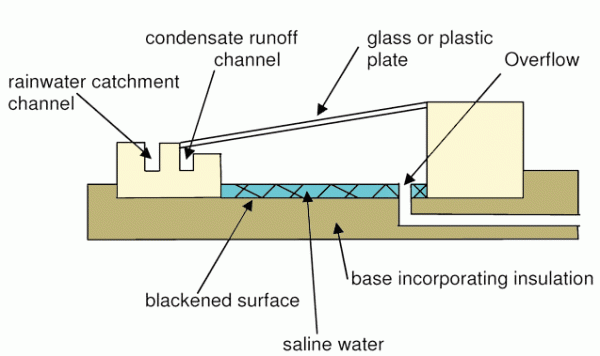It’s long-debated how one can build a solar-powered water distiller that turns salt water into fresh. Currently, many of the world’s countries are facing a water crisis. And oceans holding 96.5% of the Earth’s water, can be a great source of drinking water in the forthcoming water crisis.
While it is true that 71% of the earth’s surface is covered with water, it is also true that 96.5% of which is conveyed in the oceans. And of course, this water is not that suitable for drinking being salt water.
So is there a solution to turn the salt water into fresh drinking water? Apparently, the process is known as Desalination and Israel has just built one of the world’s biggest Reverse Osmosis plant that turns salt water into fresh water.
Prominent Methods to Turn Salt Water into Fresh
The process of Desalination is pretty simple as all you need to do it separate out water and salt from each other. In fact, you can build a home solar water distiller that makes fresh water from saltwater.
The most prominent methods for Desalination is either heating the water the same as in hydrological cycle, or Reverse Osmosis. The former one makes use of either a heating source or sun to bring water to boil and in the process, the water vapour gets generated which is nothing but fresh water.
The process of reverse osmosis is a little complicated. It comprises multiple stages from which the salt water passes and the salt is eliminated from the water. So unlike heating the water where water itself gets excluded, here, the salt is extracted from water.
Can Fresh Water be Generated from Ocean on a Large Scale?
Generating fresh water is pretty simple, right? All you need to do is heat the water, the salt is set apart, and boom, done! Right?
Absolutely not! Generating fresh water using solar water distiller or conventional water distiller at a small scale is easy. However, when you try doing the same on a large scale, it is economically not feasible. To produce a certain amount of water, the required amount of energy is enormous and practically stupid!
Hence, building a plant that mimics such process is foolish. However, one can always make use of reverse osmosis to do it on a large scale just like Israel did. Even this process comes with certain drawbacks but in a nutshell, can possibly be performed.
How does Solar Powered Water Distiller Work?

Solar Powered Water Distiller, just like the name suggest, makes use of solar energy to turn salt water into fresh drinkable water.
First, a tank-like structure is set up with glass or plastic at the top that helps to increase the intensity of sun rays if set at certain degrees that focus on a particular position. Also, the darkened bottom helps in increasing the temperature. Once the water reaches its boiling temperature it starts to evaporate and getting through the condensation process turns into droplets while reaching the glass. And at the end, sliding towards the end gets stored in a storage place.
To turn this same concept into a large-scale one is almost impossible as heating a lot of water altogether and finding something that helps with the condensation process is greatly challenging.
The following illustration also suggests how one can build a rainwater catcher using the same arrangement. Rain Water is one of the most convenient ways people can conceive fresh water. However, due to lack of awareness, a large amount of this water gets wasted down the drainage. But with such arrangement, one can utilize such free resource of fresh water as well.
Coming back to the solar water distiller, this arrangement can be made more efficient by building it from solid iron sheets or similar metallic frame as metal easily conducts heat.
The EndNote
So in a nutshell, it is possible to turn salt water into fresh using a solar-powered water distiller. However, it is only feasible at a smaller scale and practically impossible on a large scale.
So can you save your life by building a solar-powered distiller if ever stranded on an island? Absolutely, yes! But can you generate enough for a population? Well, in the current scenario, no.